UK Sanctions 13 More Iranian Officials, Entities Over Rights Abuses
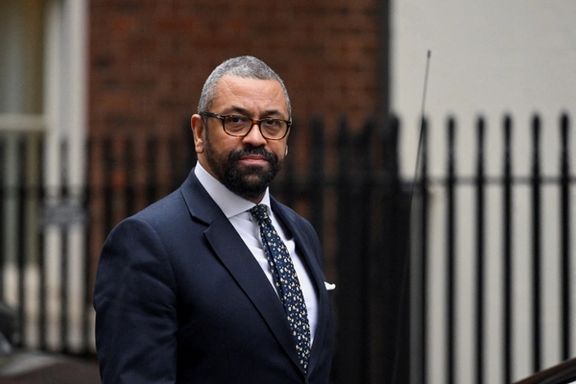
The UK government has introduced sanctions on more than a dozen more Iranian individuals and entities over human rights violations.

The UK government has introduced sanctions on more than a dozen more Iranian individuals and entities over human rights violations.
The list of 13 individuals and entities responsible for human rights abuses in Iran, released by the UK Foreign Office on Thursday, includes prison governors overseeing torture and inhumane treatment and organizations charged with collecting private information of regime opponents.
It also covers individuals leading the repression of women through Iran’s compulsory hijab laws, according to a statement by the UK government.
The sanctioned individuals include Abdolhossein Khosropanah, the secretary of Iran's Supreme Council of the Cultural Revolution; Mohammad-Amin Aghamiri, the secretary of Supreme Council of Cyberspace; and Moslem Moein, the chief of the IRGC's Basij Cyberspace Organization.
The IRGC's Cyber Defense Command (CDC) which monitors the emails, websites and online activities of regime opponents, and the Supreme Council of the Cultural Revolution (SCCR) which sets Iran’s policies on cultural and educational matters, including wear of the hijab were also sanctioned by the UK government on Thursday.
"Today the UK has sent a clear message to the regime – we will not tolerate this malign behavior and we will hold you to account," said UK Foreign Secretary James Cleverly in a statement.
"Our new sanctions regime will help to ensure there can be no hiding place for those who seek to do us harm," he added.
Cleverly also said that "the Iranian regime is oppressing its own people, exporting bloodshed in Ukraine and the Middle East, and threatening to kill and kidnap on UK soil."
The Islamic Republic has, in the past few years, been found to have attempted to carry out terror acts on UK soil, including plots to kidnap Iran International journalists, which forced the TV channel to relocate its activities from the London office to Washington DC due to the UK’s inability to protect its citizens on its soil.
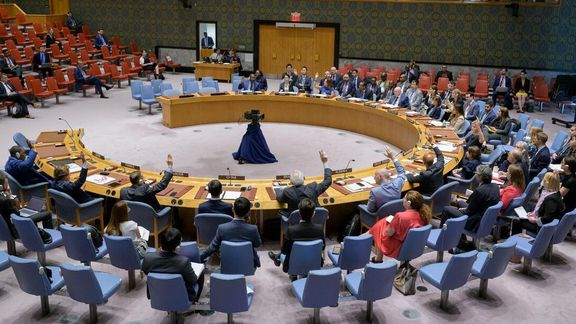
As the UN Security Council held a session on Iran, Britain says it is mulling over a new sanctions regime giving it greater powers to target the regime’s decision makers.
The Thursday session was held to brief the Council on the Joint Comprehensive Plan of Action (JCPOA) and the implementation of resolution 2231, whose clauses are justifying the UK, France and Germany retaining ballistic missile sanctions set to expire in October under the defunct 2015 nuclear deal.
Member states argue that both Iran and Russia have violated their obligations under UN Security Council Resolution 2231 by participating in the transfer of UAVs without obtaining advance approval from the UN Security Council. The United States, France, Germany and the United Kingdom say the arms supplies breach a clause of the resolution, justifying the possibility of snapback, under which multilateral sanctions would come back onto Tehran.
Resolution 2231 is a 79-page document submitted at the time by the US – S/2015/546– that listed categories of weapons needing prior Security Council approval. S/2015/546 refers to drones “capable of delivering at least a 50kg payload to a range of at least 300km,” and while Iranian-made drones can have a range of over 1,000km they carry a slightly lighter payload. There would be a clearer violation if Iran transferred Fateh-110 and Zulfiqar missiles.
US envoy to the UN Robert A. Wood said at the session that Washington remains gravely concerned with “Russia’s use of Iranian drones against Ukrainian cities and civilian infrastructure in its unprovoked war against Ukraine.”
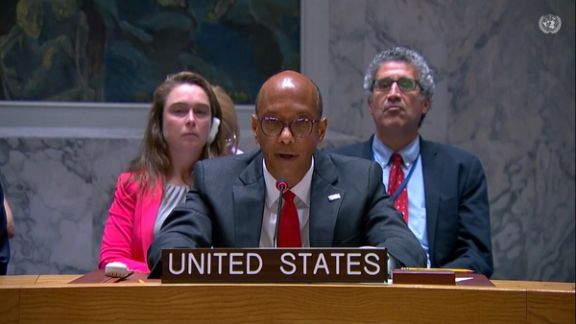
He said Russia’s use of Iranian-made Shahed-136 drones must be investigated as it clearly constitutes a violation of UN Security Council Resolution 2231, Annex B, Paragraph 4, urging the council to send teams of investigators to Kyiv to examine the debris from these weapons and to review material recovered by the United Kingdom.
“It is no secret that Iran’s UAV development and proliferation pose a global threat. That is why the transfer of these items was prohibited under 2231,” he added, noting that despite proof of Iran’s complete disregard for its obligations under Resolution 2231, Tehran continues to deny its role in the damage caused by its weaponry in Ukraine.
The US called on the Council to address “any and all violations of Resolution 2231 given the implications for not only peace and security in the Middle East, but also in Ukraine and the rest of the world,” reiterating “calls for the Secretary-General to update the Council on his assessment of Iranian made UAVs recovered in Ukraine within the next 30 days.”
He also referred to Iran’s test of a medium range ballistic missile in May, saying that the launch was inconsistent with “paragraph 3, which calls upon Iran not to undertake any activity involving ballistic missiles designed to be capable of delivering nuclear weapons, including launches using such ballistic missile technology.”
“Iran’s ballistic missile activity – especially in light of Tehran’s nuclear ambitions and its threatening rhetoric – is an enduring threat to regional and international peace and stability,” he said, stating that even after certain restrictions in Resolution 2231 terminate, the United States will continue to take vigorous measures to counter this threat and block the proliferation of sensitive ballistic missile-technology to and from Iran.
Rosemary A. DiCarlo, the UN Security Council’s Under-Secretary-General for Political Affairs, said that the council “examined information related to paragraph 4 of annex B,” pertaining to the supply, sale or transfer to or from Iran of all items, materials, equipment, goods and technology.
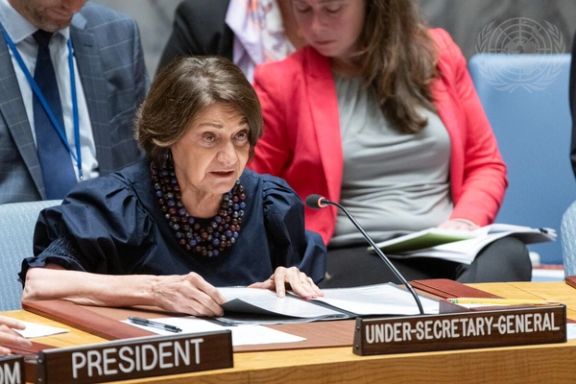
She added that they received information from the United Kingdom about ballistic missile parts seized by the British Royal Navy in February 2023, in international waters in the Persian Gulf.
“The United Kingdom shared imagery of the seized components and its analysis that the components were of Iranian origin and transferred in a manner inconsistent with resolution 2231,” she said, adding that France, Germany and the United Kingdom also conveyed their view that some of the seized components are controlled items listed in the Document S/2015/546 and that their transfer without prior approval of the Council was therefore inconsistent with the resolution.
However, she added that Iran and the Russian Federation have “stated that there was no evidence linking the intercepted vessel and its cargo to Iran, and no clear indication that the seized components were of Iranian origin. “We continue to analyze the available information," she said.
DiCarlo also expressed serious concerns about Iran’s highly enriched uranium as presented by the UN nuclear watchdog’s latest report but reiterated that the JCPOA remains the best available option for ensuring a peaceful nuclear program by Iran, urging dialogue among its parties.
“Iran now has a total enriched uranium stockpile of more than twenty times the allowable amount under the (JCPOA). This includes increased quantities of uranium enriched to 20% and 60%,” she said.
She also welcomed the March agreement between Iran and the International Atomic Energy Agency (IAEA) “to expedite… the resolution of outstanding safeguards issues” and “to allow the IAEA to implement further appropriate verification and monitoring and reporting activities”.
Earlier in the day, Cleverly said Britain seeks more leeway in targeting the Islamic Republic’s authorities, including those involved in weapons proliferation and threats against British nationals.
Britain had seen an "unprecedented level of aggression" from Iran and accused the country of trying to "silence dissenting voices" in the UK, he said.

Iran is exporting the highest amount of crude oil in five years, although it offers discounts of up to $30 per barrel The Wall Street Journal reported Thursday.
The report confirms estimates that Iran shipped 1.6 million barrels per day in May and June, up from 250,000 barrels in 2019 and 2020, just after the United States imposed full sanctions.
Tehran keeps its export and revenue details as state secret, but the WSJ quoted and Iranian official as saying that it offers deep discounts of up to $30 per barrel. This confirms earlier reports by Iran International that Tehran is selling its oil at half price, and that was one reason why it is facing financial problems, high inflation and an economic crisis.
Iran needs around $50 billion from oil exports to balance its budget, but estimates say actual annual proceeds are around $25 billion.
Another reason for Iran’s oil revenues being probably less than $25 billion is the costs involved in illicit shipments to evade sanctions, and losing money in trying to repatriate the money in hard currencies. Iran’s banking system is also under US sanction and any oil revenues are laundered through intermediaries.
The report also says that a significant part of the increased export volumes goes to Venezuela and Syria, which probably does not generate much profit, as both countries are themselves in financial crisis. Shipments to Syria might even be partly free assistance for Tehran’s war-torn ally.
A former oil official told a Tehran website Thursday that Iran is refurbishing refineries in Venezuela and trying to refine oil there that can be somehow offered in the world market.
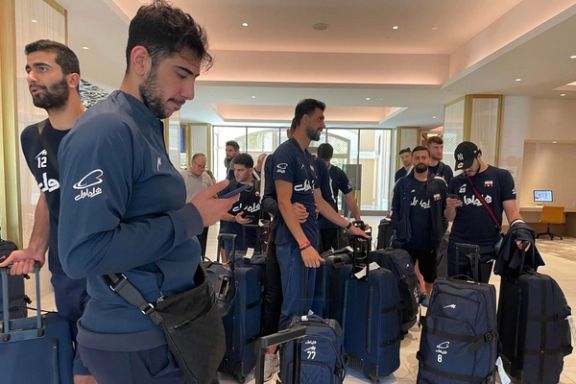
Key players and coaches from Iran's national volleyball team have been denied US visas while bureaucrats continue to travel.
The US State Department mysteriously refused the visas for the latest round of the Volleyball Nations League in California, while a long list of officials accompanying the team in the US were granted the visas.
The visit has sparked controversy in Tehran, where the Iranian public are funding bureaucrats' travel at the expense of key athletes.
Iran's national team arrived in Anaheim, California, a few days ago without its head coach Behrouz Ataei and several key players including Amin Emsaeilnejad and Mohammad-Taher Vadi. Meanwhile, the federation's public relations officer, vice-president, secretary and treasurer had been granted entry.
Milad Taghavi, the secretary of the federation and one of those initially denied a visa, called for boycotting the tournament because of the issue but finally ended up in California, according to Iran's state-run Mehr News Agency.
The Iranian website Tabnak has criticized the Iranian volleyball federation for giving a list of 60 people to the US embassy in Ankara and sending several officials to California
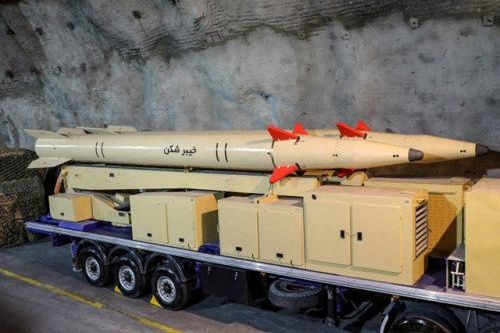
France, Britain and Germany are discussing how to deal with the approaching expiration of European Union sanctions against the Islamic Republic's ballistic missile program.
Speaking exclusively to Iran International, German Foreign Ministry Spokesperson Christian Wagner said: "We are in touch with our E3 partners [France and Britain] on how to deal with the issue of Iran," when asked about the possible extension of sanctions on Iran's ballistic missile program.
Set to expire in October under the 2015 nuclear deal, the sanctions have as yet failed to stall Iran's nuclear progress. Wagner said the Islamic Republic has developed its nuclear program in recent months in violation of its commitment under the Joint Comprehensive Plan of Action (JCPOA).
"As parties to the JCPOA and according to the UN Security Council Resolution (2231 which endorsed the JCPOA), we have commitments to respect," he added.
In his interview with Iran International, the German foreign ministry spokesman stressed that the E3 countries are discussing "what action to take" regarding the expiration of sanctions against Iran's ballistic missile program as time is running out.
European diplomats are lobbying to retain the sanctions, not only for the advancement of Iran's nuclear program but also for Iran's continued arming of Russia's war on Ukraine.
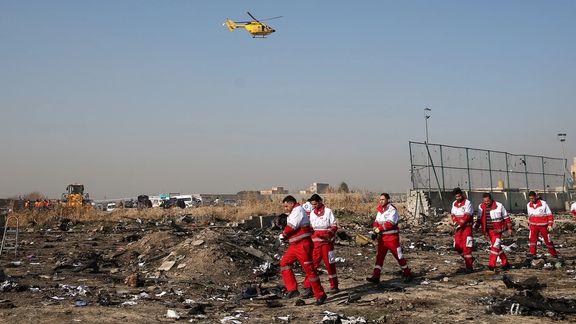
The Association of Families of Flight PS752 welcomed the move by Canada, Britain, Ukraine and Sweden to take the case to the International Court of Justice (ICJ).
“We independently filed our claim before the International Criminal Court and support the four affected countries’ referral to the International Court of Justice,” the Association said in a statement.
“Those who ordered and carried out the crime [involving] the Ukrainian airliner will not be left alone,” Javad Soleimani who lost his young wife Elnaz Nabii in the tragedy tweeted Wednesday and said suing the Islamic Republic was a very important step to attain justice for which the Association made great efforts.
“They murdered 177 innocent civilians, blatantly disrespected their remains, looted and robbed their belongings, lied for three days until they were exposed and continued to subvert justice, the Association of Families of Flight PS752 said in a statement Wednesday.
“The Islamic regime staged show trials at an unqualified and partial military tribunal to convict an unknown patsy for negligence and failure to obey orders, and sentenced him to ten years in prison,” the statement said and thanked the four countries and their legal team for “working steadfastly towards their commitment to truth and justice.”
Some of the victims’ families held a seminar in Toronto Wednesday entitled Flight PS752, Our Mission: Truth and Justice and said they would gather at the city’s Mel Lastman Square to remember the victims.

The Association’s statement was released after the announcement of the International Court of Justice (ICJ) on the same day that it received a joint application by Canada, Britain, Ukraine and Sweden which constitute the International Coordination and Response Group for the Victims of Flight PS752 against the Islamic Republic of Iran concerning the dispute over the downing of the flight on January 8, 2020 which killed all 177 onboard including an unborn child.
In a press release Wednesday, ICJ in the Hague, the principal judicial organ of the United Nations often referred to as the World Court, said the applicants claim that Iran has violated a series of obligations under the Montreal Convention because of the shooting down the civilian aircraft by military personnel of the Revolutionary Guards (IRGC) on January 8, 2020.
They also say Iran subsequently failed to conduct an impartial, transparent, and fair criminal investigation and prosecution consistent with international law.
“Iran must be held to account for their actions and we will continue to fight for the transparency, accountability and justice that victims' families deserve,” Canada’s minister of foreign affairs, Melanie Joly, tweeted after the announcement.
In a tweet Wednesday, UK ambassador to Tehran, Simon Shercliff, said the legal action reflects his country’s unwavering committed to achieving transparency, justice and accountability for the families of the victims.
Iran's hardliners have been comparing the incident with the downing of Flight IR655 on July 3, 1988, by the USS Vincennes. All 290 people onboard the Airbus were killed.
“With today marking the 33rd anniversary of the shooting down of the Iranian civilian airplane #IR655 which resulted in the death of 290 passengers and crew including 66 children, those who were shedding crocodile tears after the Ukrainian plane crash are nowhere to be seen,” a Twitter account bearing the name of Brigadier General Amir-Ali Hajizadeh, the Revolutionary Guards Aerospace Commander at the time of the incident, said on July 3.
Flying from Bandar Abbas in southern Iran towards Dubai, the UAE, IR655 was shot down during the Iran–Iraq War (1980-1988). The United States claimed the Vincennes crew had incorrectly identified the Airbus as an attacking Iranian Air Force F-14 Tomcat and that the airliner was targeted after ten attempts to contact the aircraft both on military and civilian frequencies to no avail.
US President Ronald Reagan sent a written diplomatic note to the Islamic republic shortly after the incident and expressed his deep regret for the shooting down of the plane and declared that reparations or compensation to the families of victims were "a matter that has to be discussed."